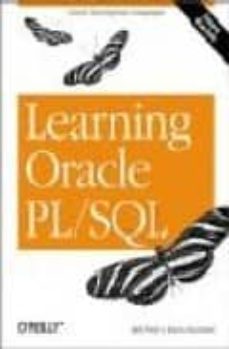LEARNING ORACLE PL/SQL de STEVEN FEUERSTEIN, BILL PRIBYL
Ficha técnica
- LEARNING ORACLE PL/SQL
- STEVEN FEUERSTEIN, BILL PRIBYL
- Número de páginas: 403
- Idioma: INGLÉS
- Formatos: Pdf, ePub, MOBI, FB2
- ISBN: 9780596001803
- Editorial: O REILLY & ASSOCIATES
- Año de edición: 2001
Descargar libros google libros online gratis LEARNING ORACLE PL/SQL 9780596001803
Overview
Oracle development tools come and go, but one of the few constants in the Oracle database environment is the PL/SQL programming language, which has been around for more than a decade. As Oracle's premier tool for building store procedures, PL/SQL uniquely supplements the standard relational database language, SQL, with the features needed to build real-world applications. Among our best-selling books on PL/SQL, Learning Oracle PL/SQL is the first one a newcomer to the language will want to read. Beginning with a discussion of what PL/SQL is and what it's good for, this book then presents language features, one at a time, in an engaging and readable way. A consistent and understandable example application--the development of a library's electronic catalog system--runs through the chapters. Topics include: Why use PL/SQL at all? Fundamental components of the language Fast ways to read and write Oracle data Organizing code for reusability Using PL/SQL to generate web-based applications Making sure your PL/SQL application is secure against hackers Benefits of using third-party developer tools Interacting with the internet (e.g., sending email from the database) New PL/SQL features in Oracle9i. Learning Oracle PL/SQL introduces PL/SQL in a way that's useful to a variety of audiences: beginning programmers, new Oracle database administrators, and developers familiar with other databases who now need to learn Oracle.


0コメント